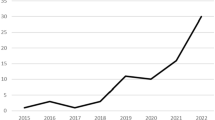Abstract
At present, humanity experiences a vertiginous period of multiple transitions, with strong repercussions on the sustainable development of our contemporary societies and business fabric. Indeed, local small and medium-sized enterprises (SMEs) particularly strive to ride the wave of digital transformation by strategically reorienting inner resources toward the optimization of their latent intellectual capital. In this line, drawn on the examination of five (5) industrial SMEs located in the region of the Basque Country (Spain), this chapter explores the role of organizational learning and knowledge management in the acceleration of their current digital transformation processes, identifying certain fundamentals of the enterprise knowledge and learning management theory, while aiming at advising research-based strategies and purposeful organizational measures to forward digital transformation in SMEs. The lessons learned from this territorial case analysis encapsulate promising implications for public/private organizations, SMEs directors/managers, and multilevel policy makers pursuing continual advancement of sustainable competitiveness of their territories.
Access this chapter
Tax calculation will be finalised at checkout
Purchases are for personal use only
Similar content being viewed by others
References
Alavi, M., & Leidner, D. E. (2001). Knowledge management and knowledge management systems: Conceptual foundations and research issues. MIS Quarterly, 107–136.
Al Saifi, S. A. (2015). Positioning organizational culture in knowledge management research. Journal of Knowledge Management, 19(2), 164–189.
Ahmad, F. et al., (2014). Relationship between transformational leadership, organizational structure and knowledge management. Proceeding of knowledge management international conference (KMICE) 2014, Vols 1 and 2; Page 617–627.
Bharadwaj, A., El Sawy, O. A., Pavlou, P. A., & Venkatraman, N. V. (2013). Digital business strategy: Toward a next generation of insights. MIS Quarterly, 471–482.
Buhse, W. (2014). Management bei Internet.
Černe, M., Jaklič, M., & Škerlavaj, M. (2013). Management innovation in focus. European Management Review, 10, 153–166. https://doi.org/10.1111/emre.12013
De Long, D., & Fahey, L. (2000). Diagnóstico de barreras culturales para la gestión del conocimiento. Academy of Management Executive, 14(4), 113–127.
Eisenhardt, K., & Martin, J. (2000). Dynamic capabilities: What are they? Strategic Management Journal, 21(10/11), 1105–1121.
Grant, R. M. (1996). Hacia una teoría de la empresa basada en el conocimiento. Strategic Management Journal, 17, 109–122.
Gibson, C. B., & Birkinshaw, J. (2004). The antecedents, consequences, and mediating role of organizational ambidexterity. Academy of Management Journal, 2, 209–226.
Gupta, K., & Govindarajan, V. (2000). Dimensión social de la gestión del conocimiento: lecciones de Nucor Steel. Sloan Management Review, 42(1), 71–78.
Lendzion, J. (2015). Human resources Management in the System of organizational knowledge management. Procedia Manufacturing., 3, 674–680. https://doi.org/10.1016/j.promfg.2015.07.303
Li, C. (2010). Open leadership: How social technology can transform the way you lead.
O’dell, C., & Grayson, C. J. (1998). If only we knew what we know: Identification and transfer of internal best practices. California Management Review, 40(3), 154–174.
Staniewski, M. (2008). The elements of human resources management supporting knowledge management. Amfiteatru Economic, Special, Noiembrie, 283–291.
Park, J., & Kim, S. (2014). The moderating roles of knowledge-transferring HR practices in the aging workforce-organizational performance relationship–from the knowledge management perspective. Journal of Human Resource Management Research, 21, 3, 173–196. https://doi.org/10.14396/jhrmr.2014.21.3.173
Petry, T. (2014). Führungskräften mangelt es oft noch an Digitalkompetenz. Human Resources Manager, 6, 86–87.
Petry, T. (2016). Digital leadership—Unternehmens- und Personalführung in der digital economy. In T. Petry (Ed.), Digital leadership—Erfolgreiches Führen in Zeiten der digital economy (pp. 21–82).
Robbin, S. (2004). Comportamiento organizacional (11th ed.). Prentice-Hall.
Teece, D. J., Pisano, G., & Shuen, A. (1997). Dynamic capabilities and strategic management. Strategic Management Journal, 18(7), 509–533.
Teece, D. J. (1998). Capturing value from knowledge assets. California Management Review, 40(3), 55–79.
Valeri, M. (2021). Organizational studies. Implications for the strategic management. Springer.
Winter, S. G. (2003). Understanding dynamic capabilities. Strategic Management Journal, 24(10), 991–995.
Yoo, Y., Boland, R. J., Jr., Lyytinen, K., & Majchrzak, A. (2012). Organizing for innovation in the digitized world. Organization Science, 23(5), 1398–1408.
Author information
Authors and Affiliations
Corresponding author
Editor information
Editors and Affiliations
Rights and permissions
Copyright information
© 2024 The Author(s), under exclusive license to Springer Nature Switzerland AG
About this chapter
Cite this chapter
Muniz-Rodriguez, N.M., Rego, A.Z., Navajas-Romero, V., Ceular-Villamandos, N. (2024). Exploring the Role of Organizational Learning and Knowledge Management in the Acceleration of Current Small Business’s Digital Transformation. In: Valeri, M. (eds) Knowledge Management and Knowledge Sharing. Contributions to Management Science. Springer, Cham. https://doi.org/10.1007/978-3-031-37868-3_8
Download citation
DOI: https://doi.org/10.1007/978-3-031-37868-3_8
Published:
Publisher Name: Springer, Cham
Print ISBN: 978-3-031-37867-6
Online ISBN: 978-3-031-37868-3
eBook Packages: Business and ManagementBusiness and Management (R0)




